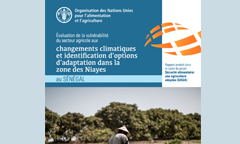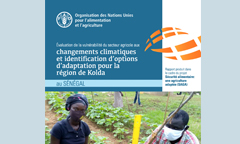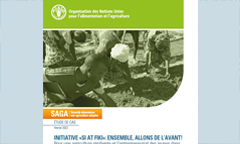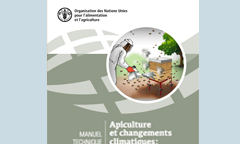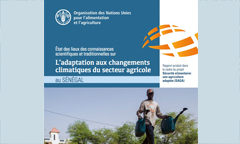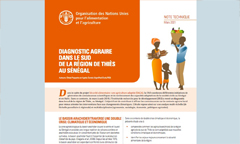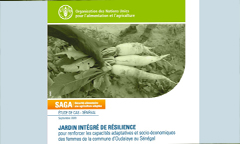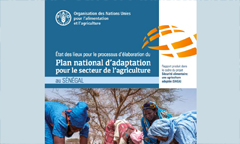
In Senegal, all activities of the project contribute to supporting the National Adaptation Plan (NAP) process as a mean to implement the adaptation component of Senegal’s Nationally Determined Contribution (NDC) in the agriculture sector. The project relies on a strong partnership between the Ministry of agriculture and rural equipment (MAER) and the Ministry of Environment and sustainable development (MEDD), the local communities in different intervention areas, civil society organizations, and academic/research institutions invested in rural development.
Latest publications
Policy support
- Strengthening the entities in charge of the political dialogue and climate change coordination mechanisms.
- Providing guidance tools based on scientific and practical knowledge, including policy and technical briefs as well as case studies, to support the inclusion of climate change in food security and agricultural sectors’ development.
- Supporting the elaboration process of the NAP for the agriculture sector.
- Developing a plan for the implementation of the adaptation component of the NDC for the agriculture sector.
Community-based pilot initiatives
- Strengthening the resilience of women producers in the Kaolack region through gender sensitive Farmer Field Schools on farming techniques adapted to climate change and gender equality.
Implementing partners: Carrefour International and APROFES. - Improving the living conditions of honey producers facing climate change in the Casamance region by conducting trainings on different techniques for honey production (quality, processing, and packaging).
Implementing partners: SOCODEVI and CAC-Miel. - Improving resilience to climate change, as well as food and nutritional security for the population of Lehar by: implementing trainings through FFS approach; implementing an entrepreneur program specifically targeting the needs of women and young people; creating a virtual platform for the promotion of innovative and resilient climate change practices.
Implementing partners: Mer et Monde. - Implementing “Consulting Clubs in soil health” and strengthening rural communities’ capacities in formulating and implementing sustainable community management of natural resources initiatives in the Diourbel and Thies regions.
Implementing partners: UPA DI and CNCR. - Promoting the sustainable water and wood resources management on the Thiès plateau by: building rainwater collection systems; distributing improved "Jambar" stoves to women; and training them on the making of plant-based charcoal.
Implementing partners: SUCO and GRAIM. - Strengthening the adaptive and socio-economic capacities of women in the commune of Oudalaye by: implementing an "Integrated garden of resilience"; co-creating a platform for income-generating activities; and providing training on climate resilient agricultural techniques and entrepreneurship and marketing strategies.
Implementing partners: CECI and FAFD. - Strengthening the resilience of farmers in the Fatick region through training of trainers program on animal feed and milk processing for small ruminants in the context of climate change.
Implementing partners: McGill University, ISRA and ARECAF.
Research activities
- Conducting vulnerability studies and identifying climate change adaptation options for the agriculture sector in the Niayes area and Kolda region.
Implementing partner: ISRA. - Analyzing the impact of various agroforestry intervention, their contributions and their potential for strengthening the resilience of agricultural sectors.
Implementing partners: Laval University and ISRA. - Analyzing the performance of livestock systems in the dairy and meat sectors in the Fatick region and identifying scenarios for improvement towards climate change resilient systems.
Implementing partners: McGill University and ISRA. - Optimizing the use of water to reduce the vulnerability to climate change of the food production sector in the Senegal River basin by: creating a climate and hydrological projections database (2020-2100 horizon); producing a hydro-economic model for the river; and assessing vulnerabilities of economic sectors of the basin.
Implementing partners: Ouranos Consortium, Laval University and OMVS.







